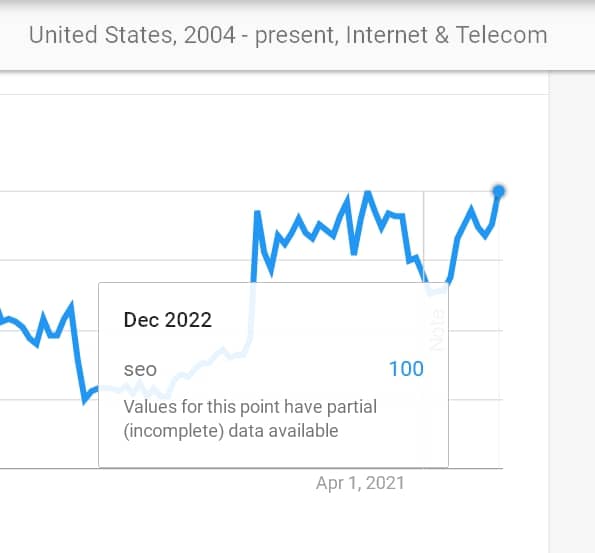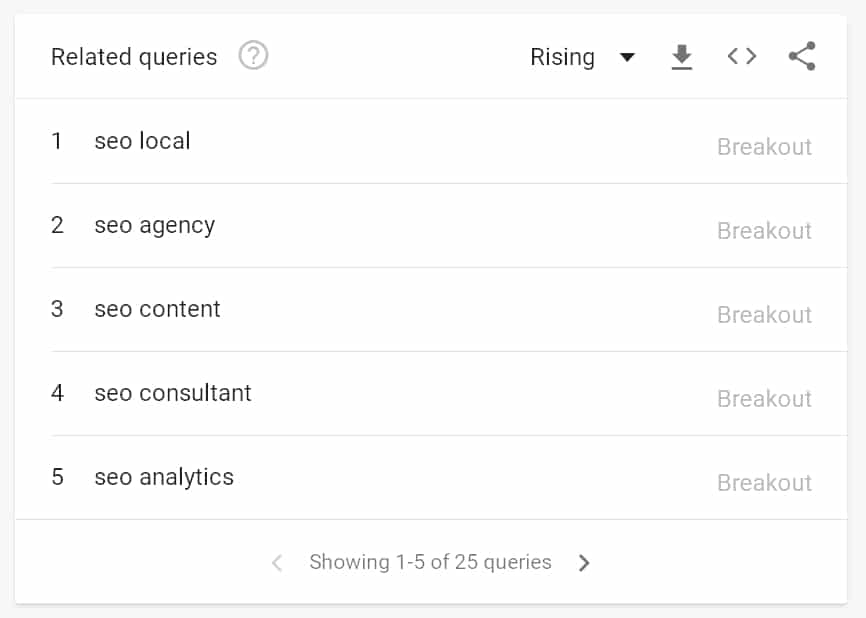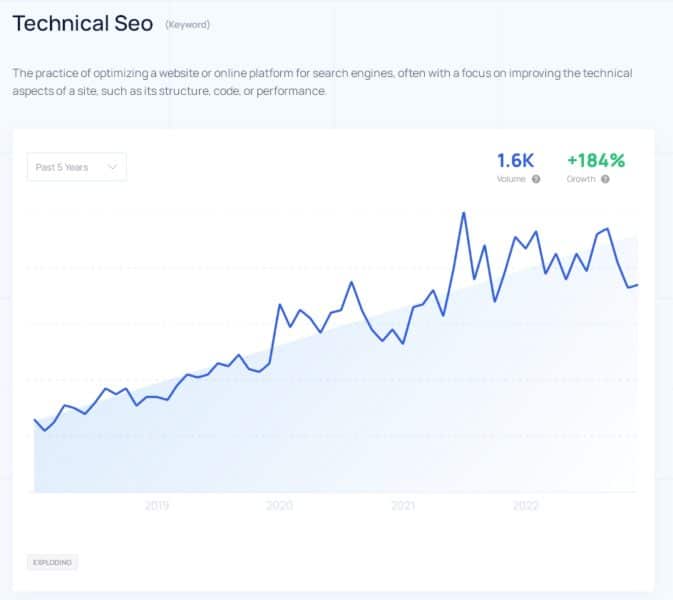SEO is alive and kicking in 2023 – and beyond
Even as Google and Microsoft reinvent search with AI-powered features, search engine optimization is here to stay.
Demand for SEO has been growing yearly based on Google Trends and Exploding Topics data. For many businesses, organic search reach is still a significant source of traffic, leads and sales.
Despite this, there’s no visible optimism within the industry. Some say the brewing economic crisis will hit the SEO industry first and hardest, with a few high-level firings of top SEO executives and industry leaders having fueled such fears.
This reminds me of a famous quotation on optimism vs. pessimism attributed to Henry Ford:
“Whether you think you can, or you think you can’t – you’re right.”
A self-fulfilling prophecy works that way. When you don’t think you can make it you won’t even try or sabotage yourself while at it. When you believe it can be done on the other hand you will excel and make it happen despite some roadblocks.
That’s why it’s important to view the situation optimistically or at least realistically. At the moment, we’re still seeing an increasing demand for SEO services and corresponding employment opportunities. Yes, SEO is alive and well.
SEO is no longer just technical
Over the years, SEO has been increasingly labeled as technical to distinguish itself from other disciplines and to justify the investment. Yet, in reality, SEO is much more than ensuring crawling, indexing and rendering or taking care of canonical tags and rich results.
Often 80% of the actual SEO work is about content and social tasks. Content SEO usually gets labeled as content marketing or simply publishing and assigned (wrongly) to other teams completely while social SEO is not (just) about social media really but rather about social relations with people who will likely link to you:
- Website owners.
- Bloggers.
- Journalists.
- Editors.
- Publishers.
You have to build relationships with actual influencers before asking for favors, especially big ones like a link. In a way, actual outreach is only the last step of proper social SEO.
Get the daily newsletter search marketers rely on.
See terms.
Social media traffic is not enough
One reason SEO was said to be dead is social media traffic. During its heyday, Facebook drew more visitors to publishers than Google did – a trend that has been reversed since 2017. Fast forward to 2023, organic search traffic dominates while social media traffic continues to dwindle.
It's not an either-or anyway.
Nowadays, SEO and social media go hand in hand – although much less obvious than a few years back when Google+ and authorship markup were clear indicators of social search. Despite Google giving up those two and other social tools and features search is inherently social in nature.
Just think of these benefits:
- Twitter can improve your visibility directly on Google.
- Facebook updates are more public than they used to be.
- Popular content on social media is much more likely to attract links naturally.
Otherwise, you have to invest a lot in outreach and other PR efforts.
While I was a big proponent of social media as early as 2007, I eventually realized that it doesn't work by itself without search engines. They have different yet complementary roles.
Social media is needed to discover new things while search is used in the final steps of the customer journey. Searching for something is impossible if you don't even know it exists. You have to discover something new outside of search first to take an interest in it and finally search for it.
Once people buy, the conversion or sale often gets attributed to search. We know this is just a small part of the truth as this form of attribution overvalues the last click.
That said, shoppers rarely buy on or through social media directly. The customer journey often starts on social media or elsewhere:
- Real life (word of mouth, billboards).
- TV and radio (including streaming).
- Print (magazines, newspapers).
We know there are at least a few "touchpoints" until a person decides to search for something and even then the search query will most likely be informational at first, then navigational and transactional only toward the end.
Social SEO also works in real life when family, friends and colleagues recommend you and your products or services to someone else. They won't buy your product from these people though, neither offline nor online. They still have to search for it.
The demand for SEO: What data tells us
Among the many changes the COVID-19 pandemic brought about is the rise of all things digital, reshaping how people live and work. Remote work and online shopping are the new norms now and in the foreseeable future.
As such, marketers who can support businesses in navigating the digital landscape are sought after. SEO is no exception.
The growing demand for SEO services and expertise persists in 2023. Let’s look at the data.
Google Trends
Demand for SEO has been growing for a few years, according to Google Trends data. In the U.S., it peaked in December 2022. (I used the "Internet & Telecom" filter to rule out some false positives from Korean pop stars.)

The following keyphrases are on top of the "related queries" list with a "breakout" instead of actual numbers (which usually signifies a growth of more than 100%):
- seo local
- seo agency
- seo content
- seo consultant
- seo analytics

Exploding Topics
Exploding Topics is great for discovering trends with skyrocketing demand.

I was surprised to find SEO among them, including:
- "Technical SEO" with a growth of 184%.
- "SEO copywriting" with 178%.
- "SEO specialist" with 146%.
LinkedIn is a good indicator of actual demand based on the number of positions for a given expertise. SEO has been in growing demand for years, especially in the wake of the pandemic.
Whatever sources you prefer, the numbers seem to prove that SEO is alive and kicking in 2023.
Even if it doesn't say SEO it might be SEO
You still don't believe that SEO is alive and well?
When your boss wants to invest in content, marketing and PR they may often mean actual SEO-related tasks, e.g.:
- Creating link magnets.
- User experience design.
- Blogger outreach.
SEO is still such a technocratic term and most people prefer proper words or less negatively connotated ones. Thus, SEO tasks are often mislabeled.
Over the years there have been many attempts to use simple language in place of SEO. Some common synonyms for SEO are:
- Findability.
- (Online) visibility.
- Website optimization.
Educational and government spokespeople often say findability as it implies a more holistic and even scientific approach.
Advocating SEO
So you want to convince your boss, a potential client or even your partner to invest time, effort and money into SEO and beyond technical best practices?
Here are some ideas on how to speak out on behalf of the still often underestimated art of search engine optimization in its full scope:
- Technical SEO
- Content SEO
- Social SEO
Google SERP real estate
There is less space on Google search result pages due to the growing number of other Google search features. Thus, competition for the remaining space for organic results also grows. You need SEO to differentiate yourself.
People Also Ask
With the plethora of search features also comes People Also Ask, an ever-growing number of real and potential (probably AI-generated) questions people might ask. Your SEO can help tap into those and divert traffic from major one-word keywords.
Empty sites don't rank
Neither empty sites nor random content will be able to help you rank on Google anymore. "The good old days" of mere link building and ignoring site quality and content are luckily over.
Your SEO can still help you find those opportunities you can create content for through keyword research. They can also create or at least optimize that content (content SEO) and tell people about it (social SEO).
With AI all over the place, will SEO still matter?
When I first drafted this article, the ChatGPT hype just started. Then, Google and Bing introduced their respective AI enhancements and tools for search.
Google's Bard preview looks a bit half-hearted, while Bing's feature-rich AI results are already very convincing.
How will AI-powered search affect SEO as a discipline? Will it still matter?
I think, with these rapid developments, businesses will need SEO advice all the more.
Ask yourself or your boss: Do you want to be among the first movers or wait until the dust settles and the competition has already optimized for AI-enhanced results?
Opinions expressed in this article are those of the guest author and not necessarily Search Engine Land. Staff authors are listed here.
Related stories
New on Search Engine Land
Do personas REALLY matter in content marketing?
This day in search marketing history: March 10
Webinar: The 360-view content strategy you need
Global Head of Microsoft Advertising steps down
TikTok enters the search ad market, challenging Google and Microsoft







